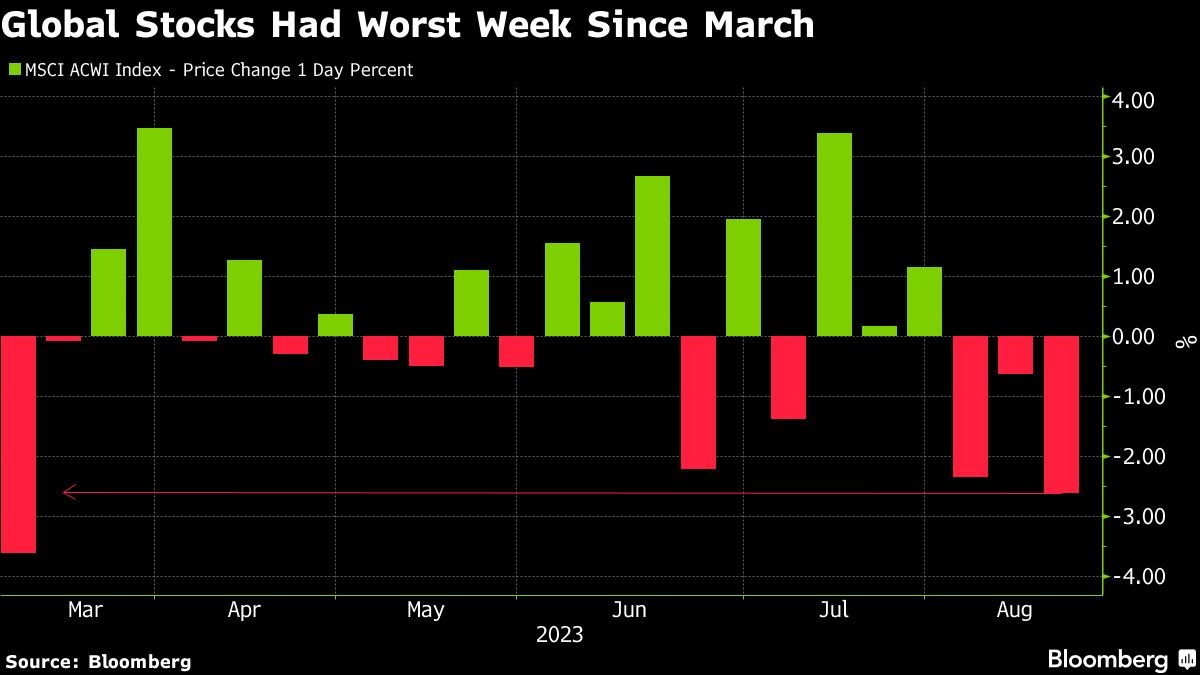(Bloomberg) — Chinese stocks fell after banks cut the interest rate on short-term loans less than expected, even after policymakers called for more lending. Stocks fluctuated in the region.
Most Read from Bloomberg
The Hang Seng fell 1.8% and headed for its lowest close since November. Shares in mainland China also extended their decline for a second day, with finance and property stocks being the biggest losers. US stock contracts trimmed previous advances.
China lowered the one-year loan prime rate to 3.45% from 3.55% and maintained the five-year loan prime rate at 4.20%. Traders were expecting a 15bp cut on both rates. The central bank and financial regulators met with bank executives last week and again told lenders to increase loans, adding to signs of growing concern about the economic outlook.
“The sudden suspension of the five-year LPR runs counter to the policy tone of a real estate bailout,” said Raymond Young, chief economist for Greater China at Australia and New Zealand Banking Group Ltd., on loan rates. “The policy message of this LPR suspension will confuse the market and dampen the sentiment effect.”
The disappointing loan rate data added to investor concerns about China’s economic recovery. Goldman Sachs Group Inc. cut MSCI China’s full-year earnings per share growth estimates fell to 11% from 14% on renewed real estate contagion fears. It also lowered its 12-month index target from 70 to 67, which would mean returns of 13% over the next 12 months.
“Until more robust policy responses are provided to support contagion risks, we believe Chinese stocks will stabilize in a lower trading range than we previously expected,” equity strategists at Goldman, including King Lau and Timothy Mu, wrote in a note.
Meanwhile, the offshore yuan extended its weakness against the dollar. The People’s Bank of China had earlier set the daily reference rate for the yuan at a level stronger than the average estimate in a Bloomberg survey.
The measure of the dollar’s strength changed little, after small losses on Thursday and Friday pared its gains over five weeks. Treasury yields are up, with 10-year near their highest levels since 2007.
Waiting for Powell
While fears of an imminent recession fade, wary investors instead face entrenched inflation and the prospect of further policy tightening ahead of the annual Jackson Hole, Wyoming, event on Thursday and Friday, which features speakers including Federal Reserve Chairman Jerome Powell and its European Union President. Her counterpart, President Christine Lagarde.
Powell is expected to “hit a more balanced tone in Wyoming, hinting at the end of the tightening cycle while emphasizing the need to keep interest rates higher for longer,” according to Bloomberg Economics’ Anna Wong.
In another sign of tension, the Cboe’s Volatility Index rose above 18 during the day Friday, hitting its highest level since May. Bank of America Corp.’s Michael Hartnett warned that stocks could fall another 4 percent, given the economic turmoil in China and the jump in bond yields.
Meanwhile, US stocks gained some strength in the closing minutes of Friday’s session in moves likely to be exacerbated by the expiration of monthly options, but it wasn’t enough to stop the S&P 500 from nearly finishing and the Nasdaq 100 to drop. MSCI had its biggest weekly loss since the Silicon Valley bank collapse in March.
Shares of US tech giants posted a third consecutive weekly decline last week, the longest such streak this year, as fears of rising global interest rates weigh on sentiment while bonds bounce off multi-year lows.
Elsewhere, oil rose after posting its first weekly loss since June and gold slipped.
Main events this week:
-
Existing home sales in the US, Tuesday
-
Austin Goolsby of the Federal Reserve Bank of Chicago speaking on Tuesday
-
Eurozone S&P Global Services and Manufacturing PMI, Consumer Confidence, Wed
-
S&P Global / CIPS UK Manufacturing PMI, Wednesday
-
US New Home Sales, S&P Global Manufacturing PM, Wed
-
US Initial Jobless Claims, Durable Goods, Thursday
-
The Federal Reserve’s annual Kansas City Economic Policy Symposium kicks off in Jackson Hole, Thursday
-
Japan Tokyo CPI, Fri
-
Consumer confidence in the American University of Michigan, Friday
-
Federal Reserve Chairman Jerome Powell and European Central Bank President Christine Lagarde deliver a speech at the Jackson Hole Conference, Friday
Some of the major movements in the markets:
Stores
-
S&P 500 futures were little changed as of 11:02 a.m. Tokyo time. The S&P 500 was little changed on Friday
-
Nasdaq 100 futures have changed little. The Nasdaq 100 fell 0.1%.
-
Japan’s Topix rose 0.3%.
-
Australia’s S&P/ASX 200 fell 0.1%
-
Hong Kong’s Hang Seng fell 1.5%
-
The Shanghai Composite Index fell 0.7%.
-
Euro Stoxx 50 futures have changed little
currencies
-
The Bloomberg Spot Dollar Index has not changed
-
The euro was little changed at $1.0871
-
The Japanese yen was little changed at 145.52 per dollar
-
The external yuan fell 0.3 percent to 7.3255 per dollar
-
The Australian dollar fell 0.1% to $0.6397
Digital currencies
-
Bitcoin fell 0.4% to $26,138.5
-
Ether fell 0.4% to $1,682.6
bonds
-
The yield on the 10-year Treasury note advanced three basis points to 4.28%.
-
The 10-year Japanese bond yield advanced 1.5 basis points, to 0.640%.
-
The 10-year Australian bond yield advances 2 basis points, to 4.25%.
goods
-
West Texas Intermediate crude rose 0.9 percent to $81.96 a barrel
-
Spot gold fell 0.2 percent to $1,884.94 an ounce
This story was produced with help from Bloomberg Automation.
— with assistance from Brett Miller and Kizzy Sun.
Most Read from Bloomberg Businessweek
© 2023 Bloomberg LP
